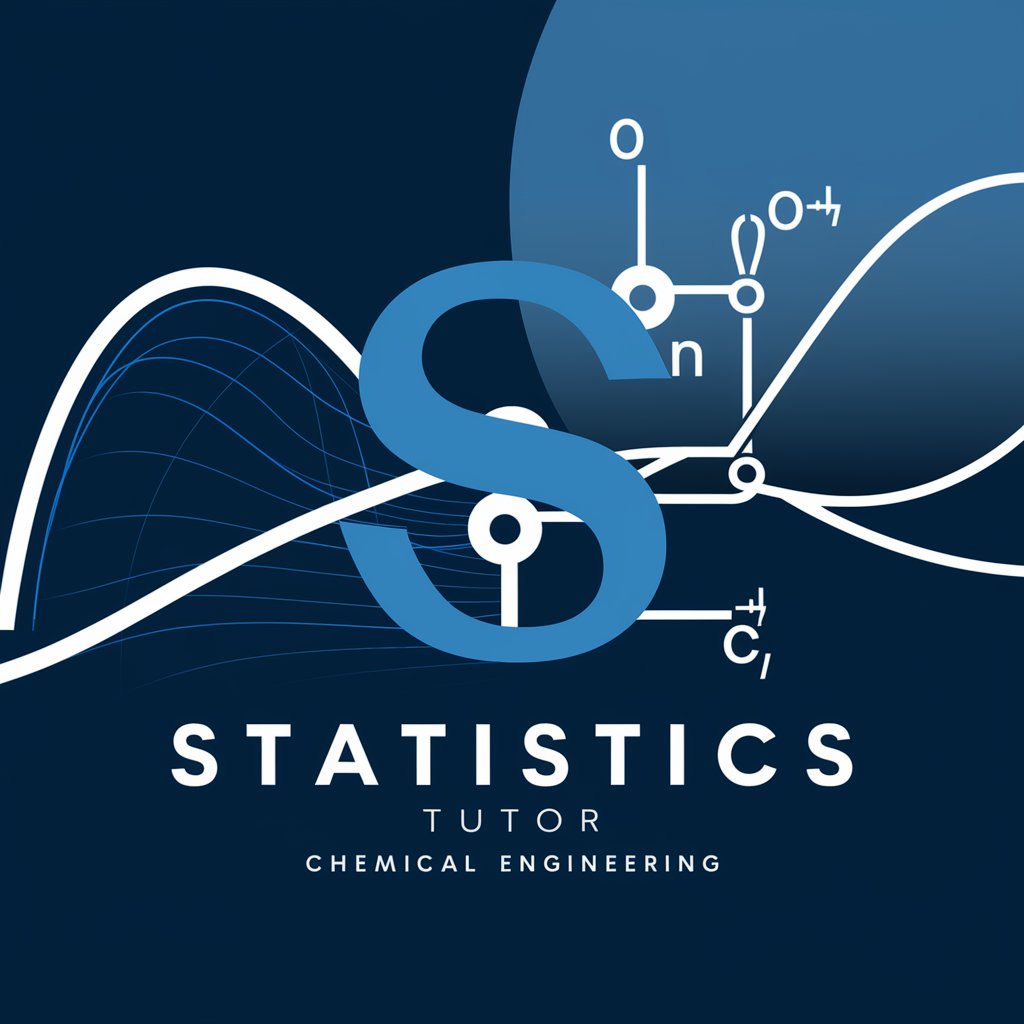
Statistics for Chemical Engineers Tutor - Statistical Analysis, Chemical Engineering

Hello! Ready to dive into statistics for chemical engineering?
AI-powered Statistics Expert for Chemical Engineers
Explain the concept of confidence intervals and their significance in chemical engineering research.
How do you perform hypothesis testing in the context of quality control for chemical processes?
Describe the application of statistical process control in manufacturing for safety and quality assurance.
What are the key steps in designing experiments for optimizing chemical reactions?
Get Embed Code
Overview of Statistics for Chemical Engineers Tutor
Statistics for Chemical Engineers Tutor is a specialized digital assistant designed to aid students, professionals, and researchers in chemical engineering by providing expert guidance in statistics relevant to their field. This tool is crafted to support learning and application of statistical methods that are essential in analyzing, designing, and improving chemical processes. The Tutor helps in understanding and applying concepts like probability distributions, hypothesis testing, design of experiments, and statistical process control. An example scenario could be a student using the Tutor to understand how to apply the Poisson distribution to predict the number of defects in a batch of chemicals. Powered by ChatGPT-4o。

Key Functions of Statistics for Chemical Engineers Tutor
Probability Distributions
Example
Calculating the probability of a certain reactor yield under given conditions using the normal distribution.
Scenario
A chemical engineering student uses the Tutor to model yield variability in a catalytic converter process.
Design of Experiments
Example
Planning and analyzing factorial experiments to determine the optimal conditions for a chemical reaction.
Scenario
A process engineer uses the Tutor to design experiments for optimizing the formulation of a new polymer.
Statistical Process Control
Example
Monitoring a manufacturing process using control charts to ensure quality standards are met.
Scenario
A quality control engineer employs the Tutor to set up and interpret control charts for a continuous distillation process.
Hypothesis Testing
Example
Testing the effectiveness of a new catalyst compared to the standard one using t-tests.
Scenario
A research scientist uses the Tutor to statistically validate improvements in catalyst performance.
Target Users of Statistics for Chemical Engineers Tutor
Chemical Engineering Students
Undergraduate and graduate students who need to apply statistical methods to coursework, thesis projects, or research assignments in chemical engineering.
Chemical Engineering Professionals
Professionals in chemical industries who need to analyze process data, design experiments, or implement quality control measures in their daily operations.
Academic Researchers in Chemical Engineering
Researchers who are looking to statistically analyze data from experimental or simulation studies to validate models or test new theories in chemical engineering.

Using Statistics for Chemical Engineers Tutor
Step 1
Access a free trial without logging in or needing a ChatGPT Plus subscription at yeschat.ai.
Step 2
Select the 'Statistics for Chemical Engineers' section to start interacting based on your specific needs in the field.
Step 3
Input your specific question or topic related to chemical engineering statistics. Include details such as data sets, statistical models, or specific problems you are facing.
Step 4
Utilize the provided computational tools to analyze your data. This could involve hypothesis testing, regression analysis, or statistical process control.
Step 5
Review the detailed explanations and solutions offered, and apply the insights gained to optimize your chemical engineering projects or research.
Try other advanced and practical GPTs
Chemical Plant Efficiency Optimizer
AI-Powered Chemical Process Enhancement

Chemical Communications Tutor
Unleashing AI for Chemical Insight

React Expert
Power Your Development with AI-Driven React Guidance

Formation
Empowering your writing with AI precision

Chamber Of Commerce AI (Official)
Powering Local Business Success

Operant Chamber Code Generator
Optimize behavioral experiments with AI-powered programming

Chemical Engineering Laboratory II Tutor
AI-driven Chemical Engineering Lab Insight

Chemical Engineering Laboratory I Tutor
Empowering Future Chemists with AI

Chemical Hazard and Safety Analysis
Powering Safety with AI Analysis

Chemical Technicians Assistant
Streamlining Chemistry with AI

Chemical Engineering Thermodynamics II Tutor
Master Thermodynamics with AI

Chemical PE Exam Tutor
AI-Driven Chemical Engineering Exam Prep

FAQs on Statistics for Chemical Engineers Tutor
What statistical distributions are most relevant for chemical engineering?
Chemical engineers often use normal, log-normal, Weibull, and exponential distributions. These distributions are crucial for modeling time-to-failure, reaction rates, and other stochastic processes in chemical manufacturing and research.
How can I use this tool for quality control in chemical manufacturing?
This tool can help apply statistical process control (SPC) techniques, analyze variability in manufacturing processes, and use control charts to monitor process stability and detect anomalies in real-time.
Can the tool assist in designing experiments for chemical engineering research?
Yes, it can assist in planning and analyzing designed experiments, determining the number of trials, the necessary conditions, and analyzing the results using ANOVA or other statistical methods to ensure robust conclusions.
Is hypothesis testing applicable in the field of chemical engineering, and how can I apply it?
Hypothesis testing is vital for determining the validity of scientific claims in chemical engineering, such as comparing process efficiencies or material properties under different conditions. This tool provides step-by-step guidance on performing these tests.
What tools does the tutor offer for data visualization?
The tutor offers guidance on creating and interpreting a range of data visualizations such as scatter plots, histograms, box plots, and control charts, which are essential for data analysis in chemical engineering.